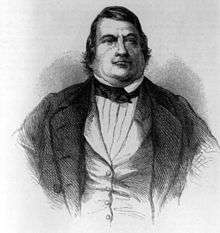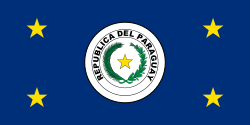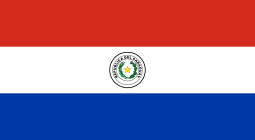Carlos Antonio López
Carlos Antonio López Ynsfrán (November 4, 1792 – September 10, 1862) served as leader of Paraguay from 1841 to 1862.
His Excellency Carlos Antonio López | |
|---|---|
 | |
| 1st President of Paraguay | |
| In office March 13, 1844 – September 10, 1862 | |
| Vice President | Mariano González (1845–1846) Francisco Solano López (1862) |
| Preceded by | himself as Consul |
| Succeeded by | Francisco Solano López |
| Consul of Paraguay | |
| In office March 12, 1841 – March 13, 1844 | |
| Preceded by | Mariano Roque Alonso |
| Succeeded by | himself as President |
| Personal details | |
| Born | November 4, 1792 Asunción, Paraguay (Then part of the Viceroyalty of the Río de la Plata) |
| Died | September 10, 1862 (aged 69) Asunción, Paraguay |
| Political party | None |
| Spouse(s) | Juana Pabla Carrillo |
| Children | Francisco Venancio Benigno Rafaela Inocencia |
Early life
López was born at Manorá (Asunción) on November 4, 1792, and was educated in the ecclesiastical seminary of that city. He attracted the hostility of the dictator José Gaspar Rodríguez de Francia, his reputed uncle,[1] which caused him to go into hiding for several years.
Political career
.jpg)
He served briefly as secretary of the military junta that ruled the country from 1840 to 1841, after the death of Francia. In 1841, Congress chose him as the country's first consul, equivalent to that of president, ruling alongside Mariano Roque Alonso. In 1844, he exiled Roque and assumed dictatorial powers. A few months later, Congress adopted a new constitution, which changed the head of state's title from consul to president and elected him to the new post for a 10-year term. The constitution vested López with powers almost as sweeping "El Supremo" had held for most of his 26-year rule, effectively codifying the dictatorial powers he had seized just months earlier. The document included no guarantees of civil rights; indeed, the word "liberty" was not even mentioned in the text.
He was re-elected for a three-year term in 1854, re-elected in successive elections for ten and three years, and in 1857 again for ten years, with the power to nominate his own successor.
His government was directed towards developing Paraguay's primary resource extraction and strengthening Paraguay's armed forces. He contracted numerous foreign technicians, most of which were English, and built up the formidable Fortress of Humaitá.[2][3]
His approach to foreign affairs several times involved him in diplomatic disputes with the Empire of Brazil, the United States, and the British Empire, which nearly resulted in war. His government was somewhat more tolerant of opposition than Francia's had been. He released all political prisoners soon after he took full power and also took measures to abolish slavery.[4]
His eldest son, Francisco Solano López (1827–1870), succeeded him as president after his death. A barrio of Asuncion is named after him.
See also
- History of Paraguay
- List of Presidents of Paraguay
References
- Bannon, John Francis; Dunne, Peter Masten (1950). Latin America, an Historical Survey. Science and culture texts (2 ed.). Bruce Publishing Company. p. 587. Retrieved 2016-02-25.
[...] a wealthy creole landowner and reputed nephew of Francia, [...] Carlos Antonio Lopez.
- Plá.
- Williams.
- Compare: Cooney, Jerry W. (1997). "Paraguay". In Rodriguez, Junius P. (ed.). The Historical Encyclopedia of World Slavery. 2. ABC-CLIO. p. 492. ISBN 9780874368857. Retrieved 2016-02-25.
The rise to power of Carlo Antonio López after Francia's death in 1840 brought a cautious, gradualist approach to the abolition of Paraguayan slavery. The government decreed a Law of Free Womb in 1842, which freed children born to slaves.
Sources

- Plá, Josefina (1976). The British in Paraguay 1850–1870. The Richmond Publishing Co in association with St Antony's College, Oxford.
- Williams, John Hoyt (1977). "Foreign Tecnicos and the Modernization of Paraguay". Journal of Interamerican Studies and World Affairs (Center for Latin American Studies at the University of Miam): pp. 233–257. JSTOR 174705
| Political offices | ||
|---|---|---|
| Preceded by Mariano Roque Alonso |
Consul of Paraguay 1841–1844 |
Succeeded by himself as President |
| Preceded by himself as Consul |
President of Paraguay 1844–1862 |
Succeeded by Francisco Solano López |

